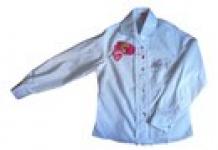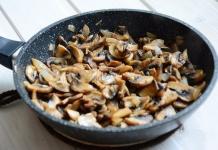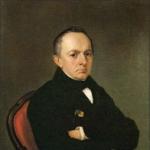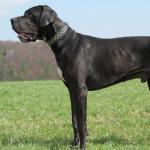The story "Lefty" was written by N. S. Leskov in 1881. Who is Lefty in the work? This is a talented Tula gunsmith who was able to surpass the English masters. However, at home, his skills were not appreciated, and he dies in the hospital, forgotten by everyone. Calling his work a story, the writer, most likely, wanted to emphasize a special "skazka" form of narration.
In contact with
The story is told on behalf of the guild foreman, and only in the final chapter are the author's reflections. Below you are offered summary"Lefty" Leskov.
Brief retelling of the work
Characters
Main characters:
- Lefty is a gunsmith who managed to forge a mechanical flea along with other craftsmen.
Description of other characters:
- Platov - Cossack chieftain.
- Alexander Pavlovich - Russian emperor, who received a clockwork flea as a gift from the British.
- Nikolai Pavlovich - Russian emperor, who ordered the Tula gunsmiths to improve the English flea.
- Tula masters are gunsmiths who were able to shoe a wind-up flea of microscopic size.
- English masters - gunsmiths and engineers, amazed at the skill of the Tula masters.
- Martyn-Sokolsky is a doctor who tried to convey the last words of Lefty to the Russian emperor.
- Chernyshev - Minister of Foreign Affairs.
The story "Lefty": a summary of the chapters
Chapter 1
 In 1814, the Russian Emperor Alexander I, accompanied by Ataman Platov, set off on a journey through Europe to see the achievements of science and art in other countries. The emperor is delighted with the inventions of foreigners, and Platov is sure that Russian masters are not inferior to foreign ones.
In 1814, the Russian Emperor Alexander I, accompanied by Ataman Platov, set off on a journey through Europe to see the achievements of science and art in other countries. The emperor is delighted with the inventions of foreigners, and Platov is sure that Russian masters are not inferior to foreign ones.
Chapter 2
Emperor Alexander I and the Don Cossack Platov visit England, where they also look at the best inventions. Alexander I is again admired by the achievements of foreigners. Platov is still sure that the masters from Russia are no worse.
Chapter 3
The English want to impress their guests and show them their brilliant invention- clockwork dancing flea, which can only be seen through a microscope. The tsar buys a flea for a million, and Platov steals a microscope so that it can be examined. After that, Alexander I and Platov return to their homeland.
Chapter 4
In 1825, after the death of Alexander I, his brother - Nicholas I - got a box with a flea. Platov tells Nikolai a story about a flea. After looking at the flea through a microscope, the tsar sends Platov to Tula. The emperor wants the Tula masters to be able to surpass the English ones.
Arriving in Tula, Platov asks local craftsmen to find a way to surpass the engineers from England. He gives the masters two weeks for this.
Having heard Platov's order, the three best Tula gunsmiths leave their homes and go to no one knows where. Among these gunsmiths was Lefty.
Chapter 7
Gunsmiths get to the city of Mtsensk in order to bow to the icon of St. Nicholas, who was considered the patron of trade and military affairs. After which they return home. Gunsmiths close in the house and do not leave it for two weeks.
Chapter 8
After two weeks, Platov comes to Tula to pick up the flea. He calls three craftsmen who were supposed to do the work.
Chapter 9
 The couriers sent for the masters came to the house where the gunsmiths were closed. But couriers were not allowed into the house, and therefore they are removing the roof from the house. Meanwhile, the gunsmiths are finishing their work and heading towards Platov.
The couriers sent for the masters came to the house where the gunsmiths were closed. But couriers were not allowed into the house, and therefore they are removing the roof from the house. Meanwhile, the gunsmiths are finishing their work and heading towards Platov.
Chapter 10
The gunsmiths give the mechanical flea to Platov. Not noticing any changes, Platov gets angry at them. Offended gunsmiths say that only the emperor will notice their work. Platov gets angry, throws Lefty into his wagon and leaves for Petersburg.
Chapter 11
In Petersburg, Platov tells the tsar that the gunsmiths did nothing and simply returned the flea. The emperor did not believe it and decided to check it himself.
When a flea is turned on, it turns out that it no longer jumps. This enraged Platov and he beats Lefty, saying that he is a deceiver. To this, the master replies that the work of gunsmiths can only be seen with a very strong microscope.
Chapter 13
Even with a very powerful microscope, the king cannot see the work of the gunsmiths. Then Lefty says that you should pay attention to the legs of the flea. After that, the emperor finally notices that the flea is shod. This surprises and pleases the king.
Chapter 14
Lefty tells the emperor that the names of the masters themselves can be seen on the horseshoes. And the name of Lefty is engraved on the nails with which the horseshoes are lined, although such powerful microscopes have not yet been invented. The Tsar sends Lefty to England to show foreigners his brilliant work.
Chapter 15
In London, the British admire the work of Russian masters. The English masters even persuade Lefty to stay so that he can get an education and work in England. However, the master refuses because he loves his native country, but he decides to stay a little.
Chapter 16
 Left-handers show the factories of England. He likes how the workers are taken care of in this country and what order they have. He also notices that the guns of the foreigners are in better condition than those of the Russians. After that, Lefty sails back to Russia and meets the half-skipper on the ship.
Left-handers show the factories of England. He likes how the workers are taken care of in this country and what order they have. He also notices that the guns of the foreigners are in better condition than those of the Russians. After that, Lefty sails back to Russia and meets the half-skipper on the ship.
Chapter 17
On the way home, Lefty and the half-skipper drink a lot, which makes them sick. One day Lefty almost falls overboard. Drunk comrades are kept in a cabin until the end of the journey.
Chapter 18
In St. Petersburg, the half-skipper is taken to the British embassy, and Lefty, weakened and unable even to talk, ends up in the quarter. The police are trying to leave him in some hospital, but he is not accepted anywhere without documents. Then he is left on the floor in a hospital for the common people.
Chapter 19
The half-skipper discovers Lefty on the hospital floor. He finds a doctor for the master with the help of Platov, but too late. Dying, the master asks the doctor to tell the king that the British "do not clean their guns with bricks." The doctor tries to convey the message of the master, but they do not listen to him and continue to clean the guns with bricks right up to the war itself.
Chapter 20
At the end of the work, the writer reflects on the fact that in the age of technological progress, brilliant masters were replaced by machines. But the memory of talented people like Lefty will live forever.
Conclusion
The essence of Leskov's story is that a huge number of craftsmen and talented people cannot fully open up due to living conditions. A short retelling of Leskov's work does not convey the full power of the writer's talent. Therefore, it is better to read the story in full.
Leskov Nikolai Semenovich- Russian writer-ethnographer was born on February 16 (Old Style - February 4), 1831 in the village of Gorokhovo, Oryol province, where his mother stayed with wealthy relatives, and his maternal grandmother also lived there. The Leskov family on the paternal side came from the clergy: the grandfather of Nikolai Leskov (Dmitry Leskov), his father, grandfather and great-grandfather were priests in the village of Leska, Oryol province. From the name of the village of Leski, the family surname Leskovs was formed. The father of Nikolai Leskov, Semyon Dmitrievich (1789-1848), served as a noble assessor of the Oryol Chamber of the Criminal Court, where he received the nobility. Mother, Marya Petrovna Alferyeva (1813-1886), belonged to noble family Oryol province.
In Gorokhov - in the house of the Strakhovs, relatives of Nikolai Leskov on the maternal side - he lived until he was 8 years old. Nicholas had six cousins and sisters. Russian and German teachers and a Frenchwoman were taken for the children. Nicholas, gifted with greater abilities than his cousins, and more successful in his studies, was not loved, and at the request of the future writer, his grandmother wrote to his father to take his son. Nikolai began to live with his parents in Orel - in a house on Third Noble Street. Soon the family moved to the Panino estate (Panin's farm). Nikolay's father himself sowed, looked after the garden and behind the mill. At the age of ten, Nikolai was sent to study at the Oryol provincial gymnasium. After five years of study, the gifted and easily studied Nikolai Leskov received a certificate instead of a certificate, as he refused to be re-examined in the fourth grade. Further education became impossible. Nikolai's father managed to attach him to the Orel Criminal Chamber as one of the scribes.
At the age of seventeen and a half, Leskov was appointed assistant clerk of the Oryol Criminal Chamber. In the same year, 1848, Leskov's father died and to help in the device further fate Nicholas volunteered for his relative - the husband of a maternal aunt, a well-known professor at Kyiv University and a practicing therapist S.P. Alferyev (1816–1884). In 1849, Nikolai Leskov moved to Kyiv with him and was appointed to the Kyiv Treasury Chamber as an assistant clerk at the recruiting desk of the revision department.
Unexpectedly for relatives, and despite the advice to wait, Nikolai Leskov decides to get married. The chosen one was the daughter of a wealthy Kyiv businessman. Over the years, the difference in tastes and interests manifested itself more and more among the spouses. Relations became especially complicated after the death of the first-born Leskovs - Mitya. In the early 1860s, Leskov's marriage actually broke up.
In 1853, Leskov was promoted to collegiate registrar, in the same year he was appointed to the post of clerk, and in 1856 Leskov was promoted to provincial secretary. In 1857, he moved to serve as an agent in the private firm Schcott and Wilkins, headed by A.Ya. Shkott is an Englishman who married Leskov's aunt and managed the estates of Naryshkin and Count Perovsky. On their business, Leskov constantly made trips, which gave him a huge supply of observations. (“Russian Biographical Dictionary”, article by S. Vengerov “Leskov Nikolai Semenovich”) “Shortly after the Crimean War, I became infected with the then fashionable heresy, for which I later condemned myself more than once, that is, I quit the government service that had begun quite successfully and went to serve in one from newly formed trading companies at that time. The masters of the business in which I settled down were the British. They were still inexperienced people and spent the capital brought here with stupid self-confidence. I was the only Russian.” (from the memoirs of Nikolai Semenovich Leskov) The company conducted business throughout Russia and Leskov, as a representative of the company, happened to visit many cities at that time. Three years of wandering around Russia was the reason that Nikolai Leskov took up writing.
In 1860, his articles were published in "Modern Medicine", "Economic Index", "St. Petersburg Vedomosti". At the beginning of his literary activity(1860s) Nikolai Leskov published under the pseudonym M. Stebnitsky; later he used such pseudonyms as Nikolai Gorokhov, Nikolai Ponukalov, V. Peresvetov, Protozanov, Freishits, priest. P. Kastorsky, Psalm Reader, Watch Lover, Man from the Crowd. In 1861, Nikolai Leskov moved to St. Petersburg. In April 1861, the first article, Essays on the Distillery Industry, was published in Otechestvennye Zapiski. In May 1862, in the reformed newspaper Severnaya Pchela, which considered Leskov one of the most significant employees, under the pseudonym Stebnitsky, he published a sharp article about the fire in Apraksin and Shchukin yards. The article blamed both the arsonists, to whom popular rumor attributed the nihilist rebels, and the government, which was unable to either put out the fire or catch the criminals. A rumor spread that Leskov connected the fires in St. Petersburg with the revolutionary aspirations of students and, despite the writer's public explanations, Leskov's name became the subject of insulting suspicions. After going abroad, he began writing the novel Nowhere, in which he portrayed the movement of the 1860s in a negative light. The first chapters of the novel were published in January 1864 in the "Library for Reading" and created an unflattering fame for the author, so D.I. Pisarev wrote: “is there now in Russia, besides the Russkiy Vestnik, at least one magazine that would dare to print on its pages something coming from the pen of Stebnitsky and signed by his name? Is there at least one honest writer in Russia who will be so careless and indifferent to his reputation that he will agree to work in a magazine that adorns itself with Stebnitsky's stories and novels? In the early 80s, Leskov was published in the Historical Bulletin, from the middle of the 80s he became an employee of Russkaya Mysl and Nedelya, in the 90s he was published in Vestnik Evropy
In 1874, Nikolai Semenovich Leskov was appointed a member of the educational department of the Scientific Committee of the Ministry of Public Education; the main function of the department was "to review the books published for the people." In 1877, thanks to the positive feedback from Empress Maria Alexandrovna on the novel "The Cathedral", he was appointed a member of the educational department of the Ministry of State Property. In 1880, Leskov left the Ministry of State Property, and in 1883 he was fired without a petition from the Ministry of Public Education. The resignation, which gave him independence, accepted with joy.
Nikolai Semenovich Leskov died on March 5 (old style - February 21), 1895 in St. Petersburg, from another attack of asthma that tormented him for the last five years of his life. Nikolai Leskov was buried at the Volkov cemetery in St. Petersburg.
- Biography
Illustration by V. Britvin
After the end of the Vienna Council, Emperor Alexander Pavlovich decides "to travel around Europe and see miracles in different states." The Don Cossack Platov, who is with him, is not surprised at the “curiosities”, because he knows that in Russia “his own is no worse.”
In the very last cabinet of curiosities, among the "nymphosoria" collected from all over the world, the sovereign buys a flea, which, although small, can dance "danse". Soon, Alexander "becomes melancholy from military affairs", and he returns to his homeland, where he dies. Nikolai Pavlovich, who ascended the throne, appreciates the flea, but, since he does not like to yield to foreigners, he sends Platov along with the flea to the Tula masters. Platov "and with him the whole of Russia" volunteered to support three Tula. They go to bow to the icon of St. Nicholas, and then lock themselves in the house at the oblique Lefty, but, even after finishing the work, they refuse to give Platov the “secret”, and he has to take Lefty to Petersburg.
Nikolai Pavlovich and his daughter Alexandra Timofeevna discover that the "abdominal machine" in the flea does not work. The enraged Platov executes and beats Lefty, but he does not admit to damage and advises to look at the flea through the most powerful "melkoscope". But the attempt turns out to be unsuccessful, and Lefty orders "to bring just one leg into the details under the microscope." Having done this, the sovereign sees that the flea is "shoeed on horseshoes." And Lefty adds that with a better “fine scope” one could see that on every horseshoe the “craftsman’s name” is displayed. And he himself forged carnations, which could not be seen in any way.
Platov asks Lefty for forgiveness. The left-hander is washed in the "Tulyanovsky baths", cut and "formed", as if he has some kind of "commissioned rank", and sent to take a flea as a gift to the British. On the road, Lefty does not eat anything, “supporting” himself with wine alone, and sings Russian songs throughout Europe. When questioned by the British, he admits: “We have not gone into the sciences, and therefore the flea no longer dances, only faithfully devoted to their fatherland.” Lefty refuses to stay in England, referring to his parents and the Russian faith, which is "the most correct." The English cannot seduce him with anything, further with an offer to marry, which Lefty rejects and disapproves of the clothes and thinness of the English women. At the English factories, Lefty notices that the workers are well fed, but what interests him most is the state of the old guns.
Soon, Lefty begins to yearn and, despite the approaching storm, boards the ship and does not stop looking towards Russia. The ship enters the Hardland Sea, and Lefty makes a bet with the skipper who will outdrink whom. They drink until the "Riga Dinaminde", and when the captain locks the debaters, they already see devils in the sea. In St. Petersburg, the Englishman is sent to the embassy house, and Lefty is sent to the quarter, where they demand a document from him, take away gifts, and then take him in an open sleigh to the hospital, where "an unknown class is accepted to die." The next day, the "Aglitsky" half-skipper swallows the "kutta-percha" pill and, after a short search, finds his Russian "comrade". Lefty wants to say two words to the sovereign, and the Englishman goes to "Count Kleinmichel", but the half-speaker does not like his words about Lefty: "even though a sheep's coat, so is the soul of a man." The Englishman is sent to the Cossack Platov, who "has simple feelings." But Platov finished his service, received a "full puple" and sent him to "commandant Skobelev." He sends a doctor from the spiritual rank of Martyn-Solsky to Leftsha, but Leftsha is already “ended up”, asks to tell the sovereign that the British do not clean their guns with bricks, otherwise they are not suitable for shooting, and “with this fidelity” he crosses himself and dies. The doctor reports the last words of Lefty to Count Chernyshev, but he does not listen to Martyn-Solsky, because "in Russia there are generals for this," and the guns continue to be cleaned with bricks. And if the emperor had heard the words of Lefty, then the Crimean War would have ended otherwise
Now these are already “deeds of bygone days”, but the tradition must not be forgotten, despite the “epic character” of the hero and the “fabulous warehouse” of the legend. The name of Lefty, like many other geniuses, has been lost, but the folk myth about him accurately conveyed the spirit of the era. And although the machines do not condone "aristocratic prowess, the workers themselves recall the old days and their epic with" human soul with pride and love.
retold
Nikolai Leskov is a Russian writer, publicist and memoirist. In his works, he paid great attention to the Russian people.
In the late period of his work, Leskov wrote a number of satirical stories, many of which were not censored. Nikolai Leskov was a deep psychologist, thanks to which he masterfully described the characters of his heroes.
Most of all, he is known for the famous work “Lefty”, which surprisingly conveys the features of the Russian character.
So in front of you short biography of Leskov.
Leskov's biography
Nikolai Semenovich Leskov was born on February 4, 1831 in the village of Gorokhovo, Oryol province. His father, Semyon Dmitrievich, was the son of a priest. He also graduated from the seminary, but preferred to work in the Oryol Criminal Chamber.
In the future, the stories of the father-seminarian and the grandfather-priest will seriously affect the formation of the views of the writer.
Leskov's father was a very gifted investigator, able to unravel the most difficult case. Due to his merits, he was awarded the title of nobility.
The writer's mother, Maria Petrovna, was from a noble family.
In addition to Nikolai, four more children were born in the Leskov family.
Childhood and youth
When the future writer was barely 8 years old, his father had a serious quarrel with his management. This led to the fact that their family moved to the village of Panino. There they bought a house and began to live a simple life.
Having reached a certain age, Leskov went to study at the Oryol gymnasium. An interesting fact is that in almost all subjects the young man received low marks.
After 5 years of study, he was issued a certificate of completion of only 2 classes. Leskov's biographers suggest that teachers were to blame for this, who treated students harshly and often punished them physically.

After studying, Nikolai had to get a job. His father sent him to the criminal chamber as a clerk.
In 1848, a tragedy occurred in Leskov's biography. His father died of cholera, leaving their family without support and a breadwinner.
The following year, at his own request, Leskov got a job in the state chamber in. At that time, he lived with his own uncle.
Being at a new workplace, Nikolai Leskov became seriously interested in reading books. He soon began attending the university as a volunteer.
Unlike most students, the young man listened attentively to the lecturers, eagerly absorbing new knowledge.
During this period of his biography, he became seriously interested in icon painting, and also made acquaintance with various Old Believers and sectarians.
Then Leskov got a job at the Schcott and Wilkens company, owned by his relative.
He was often sent on business trips, in connection with which he managed to visit different ones. Later, Nikolai Leskov would call this period of time the best in his biography.
Creativity Leskov
For the first time, Nikolai Semenovich Leskov wanted to take up a pen while working at Schcott and Wilkens. Every day he had to meet with different people and be a witness to interesting situations.
Initially, he wrote articles on everyday social topics. For example, he denounced officials for illegal activities, after which criminal cases were opened against some of them.

When Leskov was 32 years old, he wrote the story "The Life of a Woman", which was later published in a St. Petersburg magazine.
He then presented several more short stories, which were positively received by critics.
Inspired by the first success, he continued writing. Soon, very deep and serious essays “The Warrior” and “Lady Macbeth of the Mtsensk District” came out from Leskov’s pen.
An interesting fact is that Leskov not only masterfully conveyed the images of his heroes, but also decorated the works with intellectual humor. They often contained sarcasm and skilfully disguised parody.
Thanks to these techniques, Nikolai Leskov developed his own and unique literary style.
In 1867 Leskov tried himself as a playwright. He wrote many plays, many of which were staged in theaters. The play "The Spender", which tells about the merchant's life, gained particular popularity.
Then Nikolai Leskov published several serious novels, including Nowhere and On Knives. In them, he criticized various kinds of revolutionaries, as well as nihilists.
Soon his novels caused a wave of discontent from the ruling elite. The editors of many publications refused to publish his works in their journals.
Leskov's next work, which today is included in the compulsory school curriculum, was "Lefty". In it, he described the masters of weapons in paints. Leskov managed to present the plot so well that they began to talk about him as an outstanding writer of our time.
In 1874, by decision of the Ministry of Public Education, Leskov was approved for the position of censor of new books. Thus, he had to determine which of the books was eligible for publication and which was not. For his work, Nikolai Leskov received a very small salary.
During this period of his biography, he wrote the story "The Enchanted Wanderer", which no publisher wanted to publish.
The story was different in that many of its plots deliberately did not have a logical conclusion. Critics did not understand Leskov's idea and were very sarcastic about the story.
After that, Nikolai Leskov released a collection of short stories "The Righteous", in which he described the fate of ordinary people who met on his way. However, these works were also negatively received by critics.
In the 80s, signs of religiosity began to clearly appear in his works. In particular, Nikolai Semenovich wrote about early Christianity.
At a later stage of his work, Leskov wrote works in which he denounced officials, military personnel and church leaders.
This period of his creative biography includes such works as "The Beast", "Scarecrow", "Dumb Artist" and others. In addition, Leskov managed to write a number of stories for children.
It is worth noting that he spoke of Leskov as "the most Russian of our writers", and Turgenev (see) considered him one of their main teachers.
He spoke about Nikolai Leskov as follows:
“As an artist of the word, N. S. Leskov is quite worthy to stand next to such creators of Russian as L. Tolstoy,. Leskov's talent, in strength and beauty, is not much inferior to the talent of any of the named creators. scripture about the Russian land, and in the breadth of coverage of the phenomena of life, the depth of understanding of its everyday mysteries, the subtle knowledge of the Great Russian language, he often exceeds his predecessors and associates.
Personal life
In the biography of Nikolai Leskov there were 2 official marriages. His first wife was the daughter of a wealthy entrepreneur, Olga Smirnova, whom he married at the age of 22.
Over time, Olga began to have mental disorders. Later, she even had to be sent to a clinic for treatment.
 Nikolai Leskov and his first wife Olga Smirnova
Nikolai Leskov and his first wife Olga Smirnova In this marriage, the writer had a girl, Vera, and a boy, Mitya, who died at an early age.
Left virtually without a wife, Leskov began to cohabit with Ekaterina Bubnova. In 1866 their son Andrei was born. Having lived in a civil marriage for 11 years, they decided to leave.
 Nikolai Leskov and his second wife Ekaterina Bubnova
Nikolai Leskov and his second wife Ekaterina Bubnova An interesting fact is that Nikolai Leskov was a staunch vegetarian for almost his entire biography. He was an ardent opponent of killing for food.
Moreover, in June 1892, Leskov published an appeal in the Novoye Vremya newspaper entitled “On the need to publish in Russian a well-composed detailed kitchen book for vegetarians.”
Death
Throughout his life, Leskov suffered from asthma attacks, which in last years started to progress.
He was buried in St. Petersburg at the Volkovskoye cemetery.
Shortly before his death, in 1889-1893, Leskov compiled and published the Complete Works of A.S. Suvorin in 12 volumes, which included most of his works of art.
For the first time, a truly complete (30-volume) collected works of the writer began to be published by the Terra publishing house in 1996 and continues to this day.
If you liked Leskov's short biography, share it in in social networks. If you like biographies of great people in general, and in particular, subscribe to the site. It's always interesting with us!
Liked the post? Press any button.
The story "Lefty" by Leskov was published in 1881. The work is dedicated to the brilliant Tula gunsmith, who managed to surpass the English masters in skill. But his talent was not appreciated in his homeland, as a result, forgotten by everyone, he died in the hospital. The title of the story "Lefty" (The Tale of the Tula Oblique Left-hander and the Steel Flea) determines the "skazka" manner of narration. Of the 20 chapters of the story, only the final one is the reflection of the author himself. In all the rest, it is narrated on behalf of the narrator, the guild foreman.
main characters
Lefty- Tula gunsmith, who, together with his comrades, shod an English mechanical flea.
Other characters
Platov- Ataman of the Don Cossacks, who served under Alexander Pavlovich, and then under Nikolai Pavlovich.
Alexander Pavlovich- Russian emperor, who was presented with a clockwork flea during a trip to England.
Nikolai Pavlovich- the Russian emperor, who ordered the Tula masters to improve the English flea.
Tula masters- gunsmiths who managed to fill horseshoes with a microscopic clockwork flea brought by Alexander Pavlovich from England.
English masters- gunsmiths and engineers who recognized the art of Tula. They persuaded the left-hander not to leave for Russia and introduced him to various technical innovations.
Martyn-Sokolsky- the doctor, trying to convey the last request of Lefty.
Chernyshev- Foreign Secretary.
Chapter 1
The Russian Emperor Alexander Pavlovich, after the Vienna Council, at which the results of the war of 1812 with Napoleon were summed up, sets off on a trip to Europe. Everywhere he was shown various curiosities that the emperor admired. But the Don ataman Platov, who was with him on a trip, did not share the opinion of the king. He believed that Russian masters were no worse than foreign ones.
At the end of the tour, the tsar arrives in England.
Chapter 2
The British began to show the Russian Tsar their technical achievements. Alexander was delighted with foreign science, and was completely convinced that Russians were far from foreigners. Platov did his best to belittle the English masters, arguing that the Russians outperformed them in everything. Thus, the British showed the tsar a "pistol" of the fine work of an "unknown, inimitable master".
The sovereign was saddened that the Russians were not capable of creating such a miracle. And Platov opened the lock at the pistol and showed that it was made by "Ivan Moskvin in the city of Tula." Such a discovery confused the British, and they decided to create such a miracle of technology, against which Platov would have nothing to object to.
Chapter 3
In the morning, the Russian Tsar and Platov went to see the sugar factory, and then they were brought to the “last cabinet of curiosities, where they have collected mineral stones and nymphosoria from all over the world.” Here, Alexander was shown a life-sized clockwork mechanical flea created by English craftsmen. She could jump and dance. The delighted emperor gave the British a million, and they gave him this miracle of technology for this. The emperor put the flea in a case made of diamond, lowered it into a snuff box and departed for his homeland.
Chapter 4
Until the death of Alexander, a flea remained in a snuffbox. When he died, she was handed over to his wife Elizaveta Alekseevna, and from her she went to the new emperor, Nikolai Pavlovich. At first, the tsar was not interested in the flea, but then he began to think why she had been kept by her brother Alexander for so many years.
No one could solve this riddle until the old Don ataman Platov arrived at the palace. He gave Nikolai a “melkoskop”, which he had once taken from the English masters, and the tsar saw a steel flea jumping. But, unlike Alexander, the new king did not bow to foreigners. He instructed Platov to go to the Russian masters so that they would try to create something more amazing than the English flea.
Chapter 5
Fulfilling the will of the sovereign, Platov galloped to Tula, which was famous for its gunsmiths. The gunsmiths undertook to fulfill the order, but asked the Don chieftain to leave them a flea for a few days. No matter how much Platov asked, they did not tell him what they had come up with. Having achieved nothing, the chieftain went to the Don, leaving an amazing flea to the Tula masters.
Chapter 6
When Platov left, the three most skilled gunsmiths, among whom was the “oblique left-hander. There is a birthmark on the cheek, and the hairs on the temples were torn out during the exercises, ”they set off from the city. People began to wonder where they went. Many thought that the masters did not come up with anything, and in order to avoid punishment, they decided to hide, taking the royal snuffbox with them.
Chapter 7
The masters went to the city of Mtsensk, Oryol province, to ask for advice from the icon of St. Nicholas the Wonderworker. After praying, they returned to their settlement and locked themselves in Lefty's house. The neighbors were very curious about what the craftsmen were doing. Under various pretexts, they tried to lure the three gunsmiths out of the house. But none of the attempts were successful. The masters did not open to anyone and did not talk to anyone, working day and night.
Chapter 8
Having finished negotiations on the Don, Platov hurried back to Tula. He himself did not go to the masters anymore, but sent many couriers after them.
Chapter 9
The masters at this time finished their work. No matter how many couriers knocked on their door, they did not let them into the house. Then, in order to get to the stubborn gunsmiths, the couriers removed the roof from the house. After that, Lefty and his comrades left the hut and reported that they had finished their work and could go to Platov.
Chapter 10
The gunsmiths gave the ataman a steel flea in a snuffbox. He began to ask them where their work is. But, they, offended by the insults, said that only the sovereign could see her. Enraged, Platov threw Lefty into his wagon and took him with him to St. Petersburg. Upon arrival, he himself went to Nikolai Pavlovich, and left the master below with his hands tied.
Chapter 11
Platov hoped to distract the tsar from the flea by talking about the Cossacks. But he didn't succeed. Nicholas remembered the order, and ordered to bring the work of the Tula masters. Platov said that the Tula people did not create anything new, but returned the English flea back. The sovereign could not believe in the deception and decided to see for himself the words of the ataman.
Chapter 12
When they brought the flea and turned it on with a key, it turned out that the "nymphosoria" had stopped jumping. Platov was furious. He decided that the gunsmiths had broken the mechanism. The ataman went to the stairs, where he left Lefty, and began to beat him, calling him a deceiver. The left-hander claimed that the work had been done, but it could only be seen through the “melkoscope”.
Chapter 13
They brought Lefty to the king, and he showed what the work of gunsmiths was. It turns out that they managed to stuff horseshoes on the legs of an English flea. The sovereign was surprised and delighted that his Russian masters were able to surpass the British.
Chapter 14
Nikolai decided to send the master to England so that he could show his fine work to foreign masters. They dressed him better and sent him abroad with a special courier.
Chapter 15
The courier left Lefty at the hotel. And he took the flea to the masters. They found out the master who managed to shoe the flea, and came to the master at the hotel. For three days they fed and watered him, and then began to question him about his education. It turned out that the master studied "according to the Psalter and the Half-Dream Book", but does not know arithmetic at all.
Chapter 16
The British sent a courier home, and Lefty began to drive around the factories and persuade him to stay with them. But, Lefty yearned for his native Tula and asked to be released back. The English gunsmith masters put him on a ship and sent him to Russia, giving money for the journey and giving him a gold watch as a keepsake.
Chapter 17
On the ship, Lefty felt bored, and he made a bet with the half-skipper that he would outdrink him. They drank until the very end of the voyage, which made both of them sick, but no one benefited.
Chapter 18
In Russia, the half-skipper was brought to the British embassy, where they arranged excellent conditions for him. And Lefty, weakened, not even able to talk, was taken to the quarter. There he was robbed and decided to send him to some hospital for treatment. Since the gunsmith did not have a “tugament” with him, he was not accepted in any hospital. By morning, it became clear that Lefty would not live long, and he was taken to die in the Obukhvinsk hospital for the common people.
Chapter 19
The half-skipper was very worried about his friend. Miraculously, he found Lefty in the hospital and managed to get a doctor sent to see him. The dying master asks Martyn-Sokolsky to tell the sovereign that "the British do not clean their guns with bricks." The doctor is trying to convey Levsha's words to Chernyshev, but no one listens to him, and the purge continues until the start of the war.
Chapter 20
Conclusion
In the story "Lefty" Nikolai Leskov, an unsurpassed master of small literary forms, shows how many talents in the Russian people have not developed to their full potential due to living conditions. Brief retelling the works of "Lefty" chapter by chapter cannot reveal the full power artistic talent writer. Therefore, we recommend getting to know full version story.
Story test
Have you read the summary? Now try to pass the test!
Retelling rating
Average rating: 4.5. Total ratings received: 13499.




















